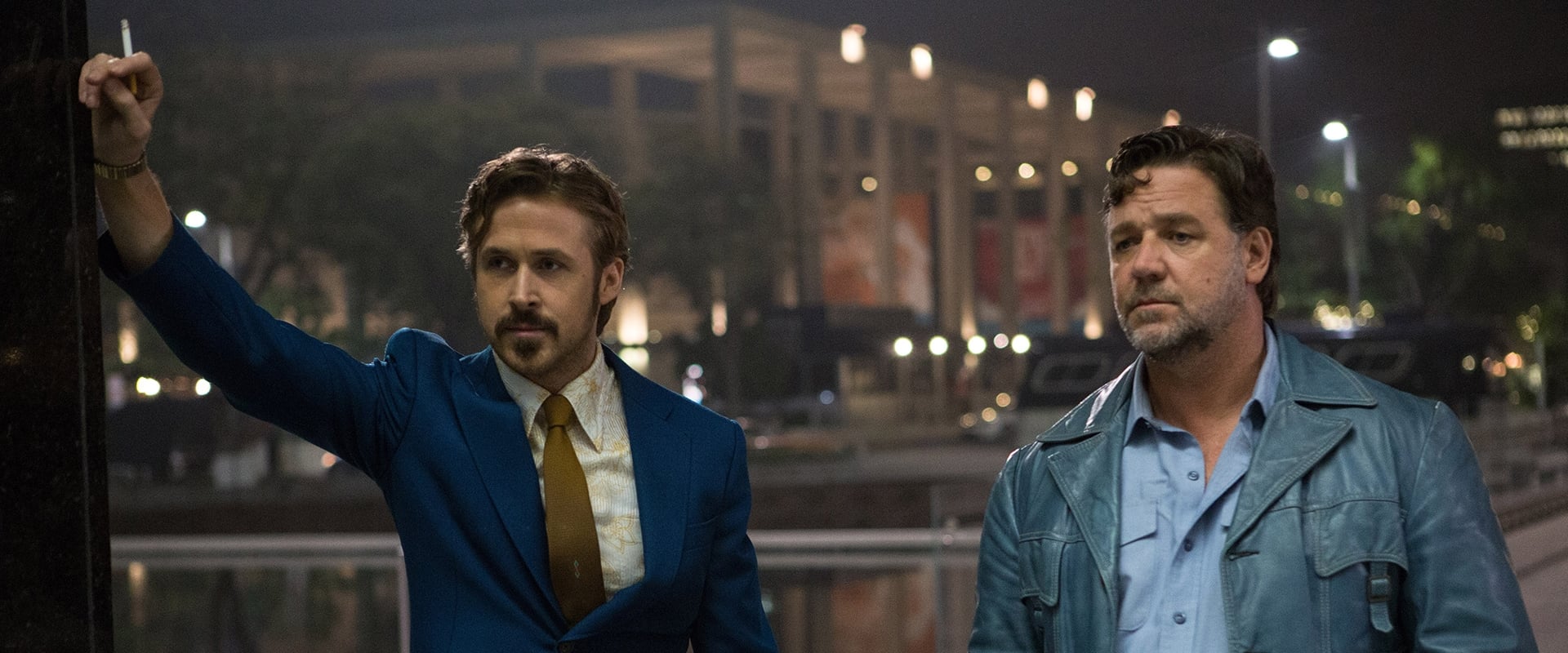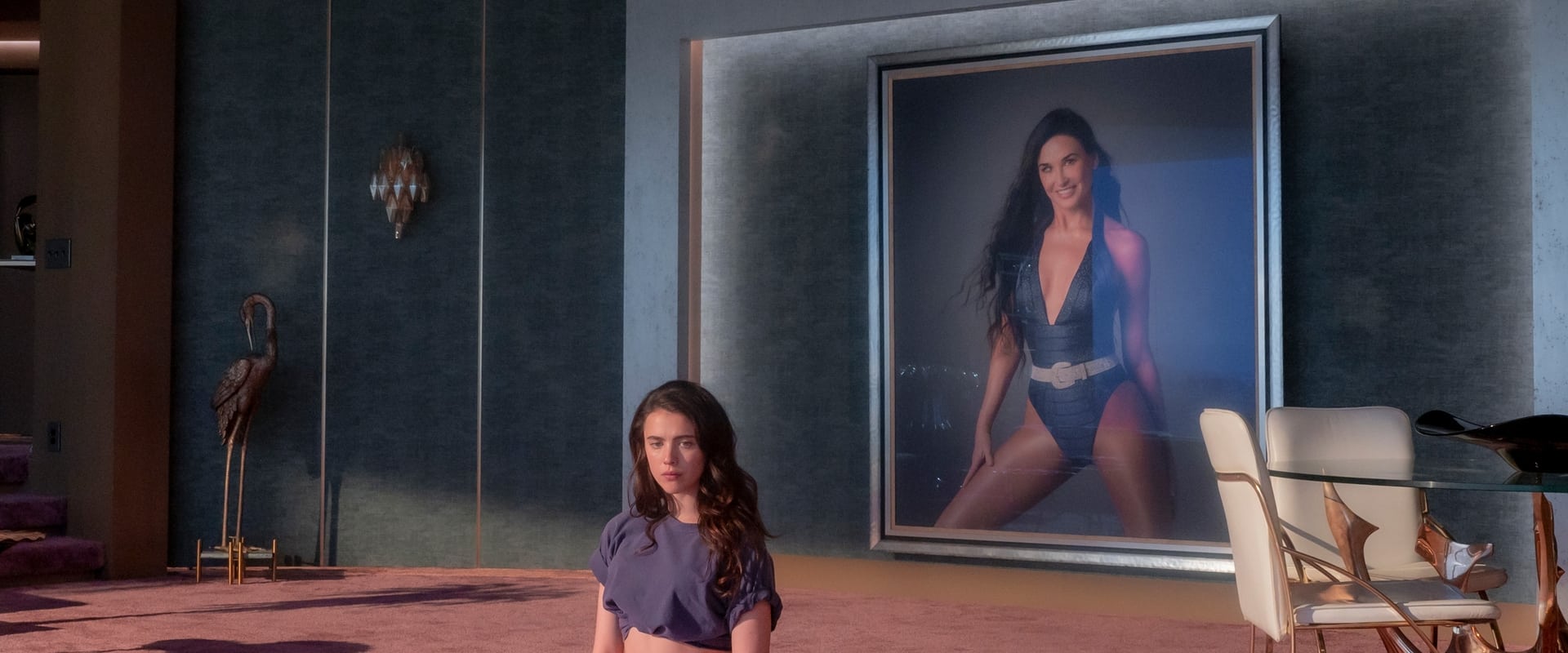Is there anything more liberating than watching a movie that understands—it really knows—that coherence is just another rule waiting to be elbowed aside for the sake of a good time? Shane Black’s “The Nice Guys” is not so much a film as a lark in polyester trousers, a two-hour tumble through the sun-blasted, over-permed insanity of seventies Los Angeles. I had a hell of a time. You go in expecting a buddy-cop movie, and you come out wondering what the hell just happened, and why you’re grinning despite it all.
This is the kind of movie that refuses to apologize for mixing its metaphors or overdressing its salad. Conspiracies bloom like mildew, porn stars die and come back again, mothers weep, Hollywood execs slither in the shrubbery, and somewhere in the wreckage, two lovable messes—Ryan Gosling’s drunken sleuth Holland March and Russell Crowe’s bulldozing bruiser Jackson Healy—stagger upright, wisecrack, bicker, and briefly dazzle before something explodes again. The pleasures are immediate and messily layered; the plot, if it can be said to exist in any logical dimension, is a swamp of ecological protest, sex film intrigue, and murder spun out so erratically you half expect Sam Spade to stumble in, toss up his hands, and limp off to a safer movie.
None of that matters. Plot is set dressing for Black, a director who’s always been in love with the clashing chords of character—how a punchline can segue into a fistfight, and heartbreak comes disguised as a pratfall. If I found myself occasionally scratching my head trying to untie the film’s narrative knots, I was too busy laughing to register more than passing concern. When you’re watching Gosling pratfall through a glass door or Crowe stare down a gunman with that lumbering certainty, the endless cascade of subplots is a happy distraction. Narrative clarity is for bankers and people who watch BBC mysteries in cardigans. This film wants you tipsy, not smart.
Let’s make no mistake: Gosling and Crowe are the show. Watching them play off each other, you get that rare sense of screwball kismet—Healy’s brute force meets March’s comic hysteria, and what we’re really watching is a duel between method acting and deadpan farce, both electrified by a director who can still get high on his actors riffing in the ruins. Gosling’s March is an absolute peach, a man so hopelessly frazzled he can barely hold his daughter’s hand without apologizing for getting her into another life-or-death situation; Crowe’s Healy is all muscle and wistful regret, the guy who punches first and mourns later.
But if this movie has a secret weapon—what the Bond films would call the gadget that actually works—it’s Angourie Rice’s Holly March. In an era when “the kid” is usually a plot device that irritates more than illuminates, here she’s the chess player in a world of checkers. Holly is never the butt of the joke; she’s the moral center, the one keeping both men pointed in the general direction of decency. Without her, the movie’s rubbery chaos would unravel for good. With her, it manages to stumble toward emotional coherence. The three of them together are a strange, rattling family: neither entirely functional nor entirely broken, which is the only kind worth watching.
Shane Black, for all his genre love and snarky digs, is a master of surface pleasures. The film’s 70s aesthetic isn’t just a coat of paint—it’s a bracing, slightly perverse cocktail of velvet blazers, burnt-orange wallpaper, and music so tacky it almost circles back to genius. And, like the best parties, the eventual hangover is forgotten in the light of all that fizz and crackle. This is the director who gave us “Kiss Kiss Bang Bang,” and while the heart-stopping cleverness isn’t always quite as lethal here, the man can still choreograph chaos, wring laughs from despair, and make a shootout feel like a vaudeville routine for existentialists.
None of this would matter if the script were dull. Luckily, Black’s dialogue is as effervescent as ever: insults ricochet off the walls, punchlines land where you least expect, and the movie’s humor is deliriously unafraid of being silly. “The Nice Guys” is not all one-liners and slapstick, though—the best gags grow out of character, out of the stubborn humanity that refuses to be sanded down by genre rules. There are moments when the humor tries too hard and the dialogue lapses into the overwritten, but hell, given the comic density on offer, you forgive it. The film is funny in the way early Zucker-Abrams movies were funny; if one joke tanks, another leaps for your throat right after. Sometimes genius, sometimes chaos—but always alive.
What caught me off guard is how the film manages to sneak in a whiff of melancholy and gravitas underneath the broad jokes. There’s a genuine curiosity here—about corruption, about ambition, about the ways families fail each other, and occasionally, save each other anyway. The villains, regrettably, don’t have the impact the movie wants; they’re ciphers, serviceable and perfectly forgettable, lacking that deranged glint that turns contrivance into menace. Still, the real nemesis here is the system—the sleaze, the rot, the machine of American commerce that’s always churning, whether filtered through pornography or protest culture. And maybe it’s for the best that March and Healy are fighting shadows rather than monsters; after all, the film’s true heart is in the way it lets its heroes lose, bungle, and stumble toward a kind of accidental virtue.
If the movie sags at all, it’s in its unfortunate devotion to narrative convolution—plot twists sprout like weeds, and the story’s logic sometimes evaporates entirely. But, dear reader, if you’re going to complain about sense in a Shane Black movie, perhaps you’re at the wrong party. “The Nice Guys” doesn’t want to be solved, only savored. It’s fun, damn it—plain and rare in a genre that so often confuses itself with grit or gravitas.
So, if you’re in the mood for a movie that laughs at its own excesses and lets its characters be both fools and saviors, this one’s a knockout. “The Nice Guys” doesn’t just revive the buddy-cop genre—it sets it dancing in platform shoes and lets it cross the street against traffic. With a few more stories as wild and joyous as this, I might even start missing the 70s (minus the smog and polyester).
Let’s call it what it is: a delirious, charming ride with enough screwball spirit to outpace a thousand smarter, duller mysteries. If you find yourself getting lost in the plot—just laugh, and let the movie buy you another round.


